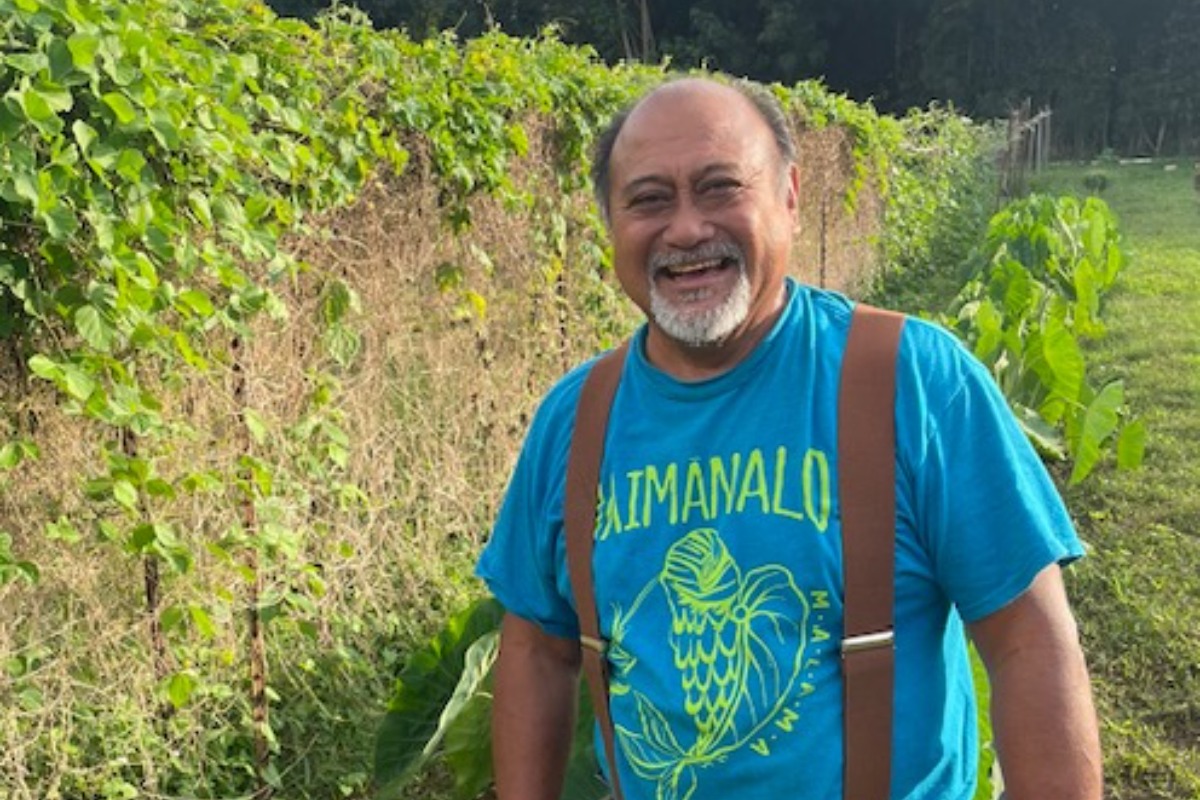Meet the Modern Farmer Working to Increase Food Self-Reliance in Hawaii
Kahua Pa’a Mua’s executive director, David Fuertes, believes sustainability not only comes from connecting with the land but also to each other.
Meet the Modern Farmer Working to Increase Food Self-Reliance in Hawaii
Kahua Pa’a Mua’s executive director, David Fuertes, believes sustainability not only comes from connecting with the land but also to each other.

David Fuertes wants to bring people together through farming.by Libby Leonard.
In 2012, after the Great Recession, legislation was introduced in Hawaii that acknowledged and attempted to solve the archipelago’s dangerous dependence on imported food.
At the time, 92 percent of Hawaii’s food was coming from somewhere else.
However, before the legislation was introduced, in North Kohala, the rural northern tip of Hawaii Island that’s zoned mainly for agriculture, community leaders had already come up with a plan to reach 50-percent food self-sufficiency in the next two decades.
One of those community leaders was David Fuertes, who along with his wife Carol, decided, in response, to form the agriculture education nonprofit Kahua Pa’a Mua.
Initially an expansion of a family taro cooperative, the nonprofit has grown in the last 12 years to have culturally rooted ‘aina (land)-based programs for both youth and adults, where the goal is not just to empower them to grow their own food but to foster aloha and togetherness.
Fuertes, who came from a long line of community builders and homesteaders, moved to North Kohala in 1975, but he grew up as one of eight children in Kauai, where his father migrated from the Philippines to work for one of Hawaii’s many sugarcane plantations.
His father was one of the community organizers of fellow plantation workers to strike for better work conditions and pay. Low wages led many plantation families, including the Fuertes’, to sustain themselves with their own gardens, chickens and goats.
While having that garden left an impression, it wasn’t until Fuertes was 14, when his agriculture teacher had him learn to recite the creed from the Future Farmers of America (FFA), that Fuertes would begin his life-long agriculture journey and craft the values that would help him fulfill his vision for wanting to help the community down the line.
Founded in 1928, the FFA is one of the largest youth organizations in America, promoting agriculture education. Its creed—which involves faith, leadership, maintaining a fondness for the work in times of discouragement and bringing abundance to others, not just oneself—is something Fuertes still recites.
It would be one of his fellow FFA colleagues that would eventually donate five acres of unused land to Fuertes and become home to the nonprofit’s agricultural Learning Lab farm.

At that farm, along with another five acres that contains their certified imu (underground oven), they have their Ho’okahua Ai (HA) youth mentorship program, which teaches students from ages 13 to 21 about animal husbandry and crop production to grow and distribute food throughout the community. Ho’okahua Ai in Hawaiian translates to: “to build a foundation of nutrition, sustenance, communication and sharing.”
“What we teach our students are values, not just planting, which I think strengthens the program and has our kids coming back,” says Fuertes, adding that part of his purpose is to help the youth connect more to who they are, so they can more easily connect to their purpose.
The youth initiative sustainably employs both organic farming and Korean Natural Farming methods. The latter fertilizes soil with indigenous microorganisms from one’s surrounding area, helping to produce healthy soil and high-yield crops.
These methods are also employed by the nonprofit’s Ohana Agriculture Resilience (OAR) initiative, which provides six to 10 families with two 100-foot crop rows to grow whatever they want on their farm for free.
Over the course of a year, families learn various aspects of farming and animal husbandry, attending several workshops led by Fuertes with other mentors and organizations, which teach topics such as plant propagation, crop production, aquaponics, poi-making and Hawaiian plant medicine practices.
Once they graduate from the program, the families have a choice of equipment to continue their own operations at home. Options include a mobile pen called a chicken tractor to raise chickens, a Korean Natural Farming odorless pigpen that composts manure and processes toxins under the pig’s feet or an aquaponics tank to grow fish and soil-less produce.
During the pandemic, the OAR families organized to plant more crops to help feed the community. They ended up growing and giving away hundreds of pounds of produce and poi to the food insecure, many of which were area kupuna (elders).
The nonprofit also partnered with youth conservation nonprofit KUPU to host a farm training initiative for those who lost their jobs due to the COVID-19 pandemic, giving them pay and benefits to work alongside the HA and OAR programs.
“My thing is bringing people together, working together and finding a common purpose,” says Fuertes, who hopes to maximize the same values in the community to make Kohala a better place. “It’s not for us now. It’s for the next generation and the generation that’s not even born yet. That’s who we’ve got to work for.”
Follow us
This work is licensed under a Creative Commons Attribution-NoDerivatives 4.0 International License.
Want to republish a Modern Farmer story?
We are happy for Modern Farmer stories to be shared, and encourage you to republish our articles for your audience. When doing so, we ask that you follow these guidelines:
Please credit us and our writers
For the author byline, please use “Author Name, Modern Farmer.” At the top of our stories, if on the web, please include this text and link: “This story was originally published by Modern Farmer.”
Please make sure to include a link back to either our home page or the article URL.
At the bottom of the story, please include the following text:
“Modern Farmer is a nonprofit initiative dedicated to raising awareness and catalyzing action at the intersection of food, agriculture, and society. Read more at <link>Modern Farmer</link>.”
Use our widget
We’d like to be able to track our stories, so we ask that if you republish our content, you do so using our widget (located on the left hand side of the article). The HTML code has a built-in tracker that tells us the data and domain where the story was published, as well as view counts.
Check the image requirements
It’s your responsibility to confirm you're licensed to republish images in our articles. Some images, such as those from commercial providers, don't allow their images to be republished without permission or payment. Copyright terms are generally listed in the image caption and attribution. You are welcome to omit our images or substitute with your own. Charts and interactive graphics follow the same rules.
Don’t change too much. Or, ask us first.
Articles must be republished in their entirety. It’s okay to change references to time (“today” to “yesterday”) or location (“Iowa City, IA” to “here”). But please keep everything else the same.
If you feel strongly that a more material edit needs to be made, get in touch with us at [email protected]. We’re happy to discuss it with the original author, but we must have prior approval for changes before publication.
Special cases
Extracts. You may run the first few lines or paragraphs of the article and then say: “Read the full article at Modern Farmer” with a link back to the original article.
Quotes. You may quote authors provided you include a link back to the article URL.
Translations. These require writer approval. To inquire about translation of a Modern Farmer article, contact us at [email protected]
Signed consent / copyright release forms. These are not required, provided you are following these guidelines.
Print. Articles can be republished in print under these same rules, with the exception that you do not need to include the links.
Tag us
When sharing the story on social media, please tag us using the following: - Twitter (@ModFarm) - Facebook (@ModernFarmerMedia) - Instagram (@modfarm)
Use our content respectfully
Modern Farmer is a nonprofit and as such we share our content for free and in good faith in order to reach new audiences. Respectfully,
No selling ads against our stories. It’s okay to put our stories on pages with ads.
Don’t republish our material wholesale, or automatically; you need to select stories to be republished individually.
You have no rights to sell, license, syndicate, or otherwise represent yourself as the authorized owner of our material to any third parties. This means that you cannot actively publish or submit our work for syndication to third party platforms or apps like Apple News or Google News. We understand that publishers cannot fully control when certain third parties automatically summarize or crawl content from publishers’ own sites.
Keep in touch
We want to hear from you if you love Modern Farmer content, have a collaboration idea, or anything else to share. As a nonprofit outlet, we work in service of our community and are always open to comments, feedback, and ideas. Contact us at [email protected].by Libby Leonard, Modern Farmer
February 20, 2022
Modern Farmer Weekly
Solutions Hub
Innovations, ideas and inspiration. Actionable solutions for a resilient food system.
ExploreExplore other topics
Share With Us
We want to hear from Modern Farmer readers who have thoughtful commentary, actionable solutions, or helpful ideas to share.
SubmitNecessary cookies are absolutely essential for the website to function properly. This category only includes cookies that ensures basic functionalities and security features of the website. These cookies do not store any personal information.
Any cookies that may not be particularly necessary for the website to function and are used specifically to collect user personal data via analytics, ads, other embedded contents are termed as non-necessary cookies.
David! Mahalo nui loa! You are awesome! Proud to say you are a Waimea High School graduate! Aloha!